Space cadets
Updated: 2016-10-21 16:27
By Wang Yuke(China Daily USA)
|
|||||||||
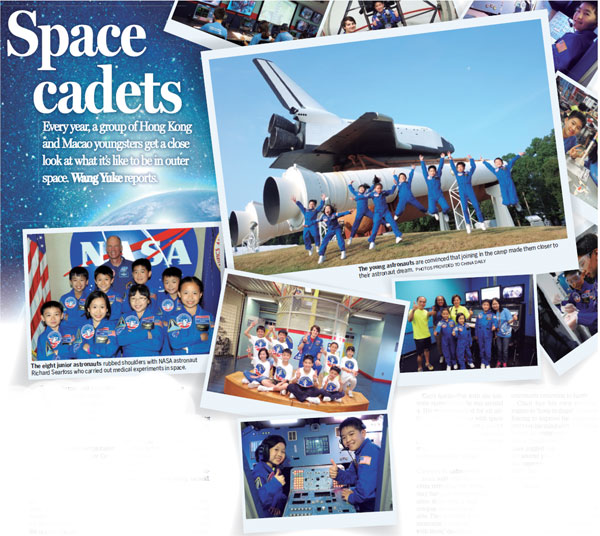
Every year, a group of Hong Kong and Macao youngsters get a close look at what it's like to be in outer space. Wang Yuke reports.
Applause and exclamations of congratulation echoed throughout the welcoming ceremony marking the triumphant return of eight of Hong Kong's junior "astronauts" from a simulated mission to outer space.
Their nine-day space exploration took them to the US Space Camp in Huntsville, Alabama and to the Kennedy Space Center in Florida. They experienced weightlessness and conditions like those of the lunar surface, accomplished virtual missions outside an orbiting space shuttle and experienced the disorientation of a simulated reentry into earth's atmosphere from the depths of space.
The kids are Hong Kong primary pupils aged from 9 to 11, from different economic circumstances and different interests. What they all shared was the dream of traveling into space. They were part of the MassMutual Jr Space Camp program, operational since 1999 and training kids who are interested in space exploration from Hong Kong and Macao.
Billy Gao Hung-wah, a fifth grader, loved the Moonwalk simulation program that allowed him to experience 1/6 gravity. "Floating (in the weightless environment), I liked the giddy sensation," he said enthusiastically. The tricks to navigate from A to B in space are the "bunny jump" and the "crab sidewalk", he preached. One bunny hop would project him about three meters above the ground, like superman, as he described himself.
Another fifth grader, Karson Chan Shing-zik, described the simulated re-entry to earth's atmosphere on the multi-axis trainer as his toughest test. "It's more of a challenge psychologically than physically. I was afraid of heights," said Chan. There he was, 90 feet above the floor, attached to a machine that would fall precipitately while spinning him around 360 degrees. As the machine swirled and twisted unpredictably, Chan said, his body spun so fast that he was unable to focus his eyes, and then came dizziness, and then vertigo. "It's much like riding a roller coaster - something I never dared to try," he said.
Fascinating experience
It was the sensation of feeling being suspended in mid-air at great height, followed by high acceleration on a tangential course that proved his most difficult challenge. His acrophobia could have rendered him ineligible for the program, so he resisted the fear. During this personal "ordeal", he kept his fear under control by doing math calculations during the most unpleasant part of the ride.
"I used to stand on a high level, head down, looking down for as long as I could and forcing my eyes open." It was this personal achievement that enabled Chan to pass the rigorous selection test before he was given a green card to the camp, together with the other seven who attended.
Each participant at the camp was given a specific mission assignment. Gao was the pilot. He decided when to launch. Seated beside the commander, he monitored the interior and exterior temperatures in real time. Neither an overly fast speed nor a high temperature is appropriate for launch. To ensure the best timing for launch, he had to keep a close eye on the data displayed on the heads up display, ready to take prompt action at the first sign of any malfunction, Gao recounted, having to cope with a sudden increase in air pressure and an unexpected breakdown of the space shuttle's landing gear. "It requires extremely fast response to emergencies and has no room for errors," he summed up.
Chan's responsibility, as a mission specialist, was to repair and upgrade equipment inside the space station. While it's routine in daily life, tinkering with machine parts in the weightless environment is a different story, he said. "Wearing the bulky spacesuit restricted my movements. I had to crawl and float all the way from the space shuttle to the space station before clambering up a chair, under the weightless conditions to perform the assembly," he hastened to add, "It's hard, but I relished the experience."
Chan recounted that it took him a long time adjusting a loose screw and striking a nail with a hammer. "I sweated a lot, so sometimes the screw slipped out of my wet gloves and drifted away. Then I needed my coach to catch it and toss it back to me," Chan laughed, acknowledging that a person without patience, resourcefulness and team spirit could not pass the test.
Gao's fascination with the universe started when he was around 4. His mother worked for an airline. Chen fell in love with space science after being given a model of the solar system. Possessed of a good memory and a habit of taking notes, he acquired a fair amount of cosmological knowledge.
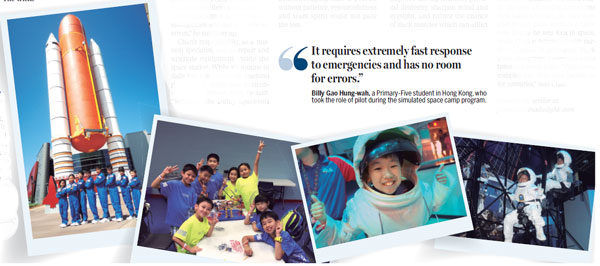
Careers in astronomy
Both kids said they believe in extra terrestrial life forms. "They may have an outrageous appearance: three eyes, a long nose and octopus-like feet, but they are adorable. They probably live on carbon monoxide. I want to make friends with them," described Chan.
Gao chimed in, "They are odd-looking creatures with several noses and ears and without skin. They move around like a clumsy robot and they are as tiny as ants."
Opportunities and success favor those who are well prepared. The two junior "astronauts" have started regular physical training in the hope that someday they will get an opportunity to go back to NASA for additional training.
"I'm a little fat," Gao said, flushed, "so I must do frequent exercises to shed some weight." He plays table tennis, rugby and basketball to make him taller, improve his leg muscles, physical dexterity, sharpen mind and eyesight, and reduce the chance of slack muscles which can afflict astronauts returning to Earth.
Chan has his own exercise regime to "keep in shape". He takes fencing to improve his endurance and keep his mind alert. His father serves as companion, a trainer and a cheerleader. Father and son have jogged together every day for several years. Chan's stamina has improved. In the beginning he could run only a kilometer. Now they've extended their runs to five kilometers.
His father was also aware of having his son psychologically primed and he had spent holidays with son in primitive and underprivileged villages on the Chinese mainland in the hope of building resilience and adaptiveness in his son.
The parents know that being an astronaut is dangerous.
"There's no job that's a hundred percent safe," said Chan's father. "Besides, boys should be adventurous and think big. His mother's still a little worried, but I'll convince her anyway."
Gao's mother made it clear that she will always back her son, no matter what career he chooses. "The only thing we can do as parents is to assist our children to live fulfilled lives without any regret."
The path to becoming an astronaut entails perseverance, patience and determination, which is a reality the two promising astronauts have taken on board. So, they have plan B. Gao plans to study astronomy before he sets foot in space, while Chan is fascinated with particular aspect of astronomy, black holes, along with theoretical white holes and worm holes. "They are so complex that they have baffled us for centuries," said Chan.
Contact the writer at jenny@chinadailyhk.com
- Lavrov, Kerry discuss Syrian situation
- Turkish troops kill 17 IS militants since Mosul operation: FM
- 59 killed in attack on police academy in Pakistan
- Syrian forces capture new area in Aleppo
- Fate of child migrants uncertain before France demolishes Jungle camp
- Former Japan SDF official believed to have blown himself up, injures 3
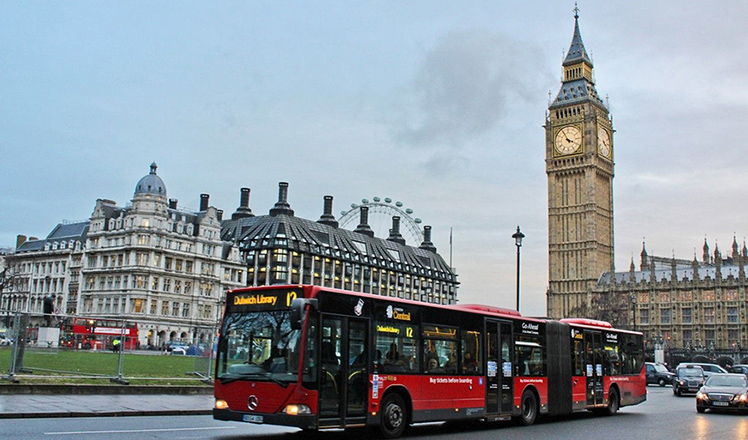
 Top 5 property destinations for Chinese investors
Top 5 property destinations for Chinese investors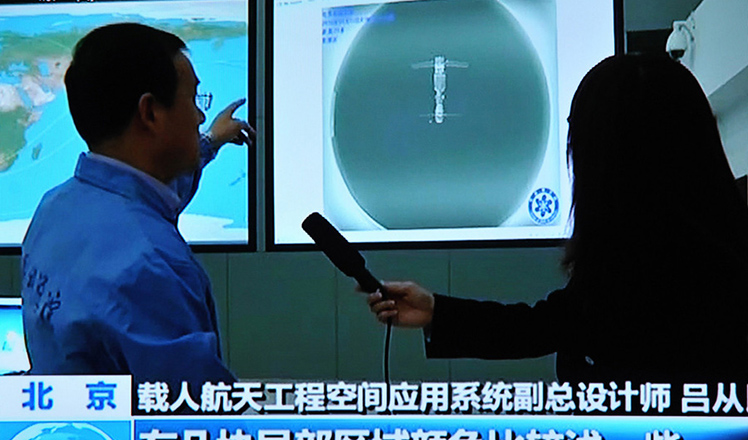
 Accompanying satellite sends back images of Tiangong II, Shenzhou XI
Accompanying satellite sends back images of Tiangong II, Shenzhou XI
 Dare you jump
Dare you jump
 Through the lens: Under the blue sky of Tibet
Through the lens: Under the blue sky of Tibet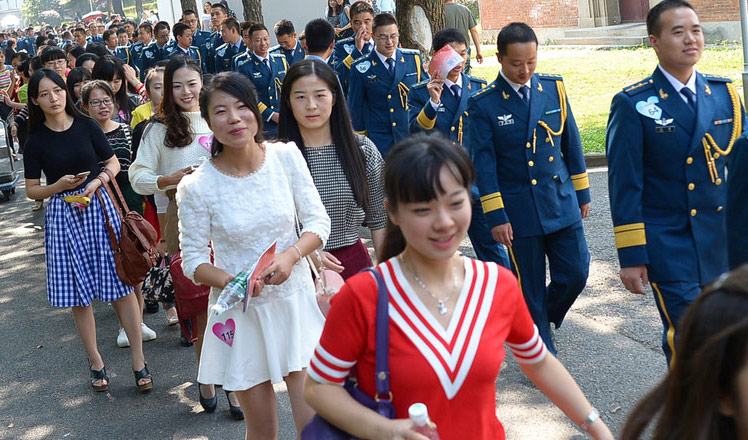
 Military blind date attracts hundreds young women
Military blind date attracts hundreds young women
 Britain's Red Arrows arrive at Zhuhai for China air show
Britain's Red Arrows arrive at Zhuhai for China air show
 Villagers build ladder on cliff with 1,500 steel pipes
Villagers build ladder on cliff with 1,500 steel pipes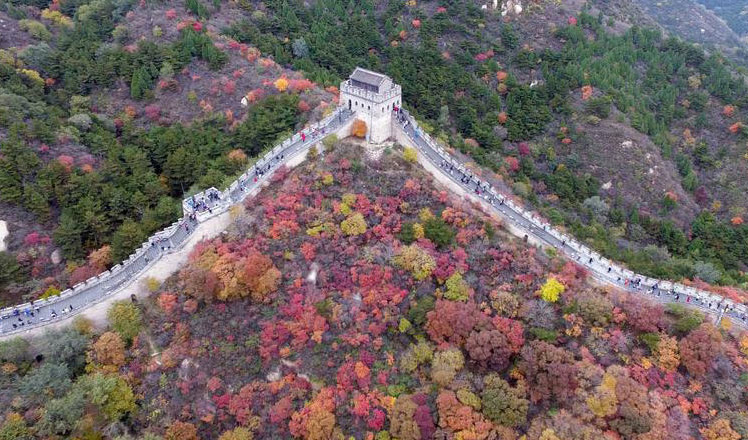
 Colorful leaves adorn Great Wall in Beijing
Colorful leaves adorn Great Wall in Beijing
Most Viewed
Editor's Picks

|

|

|

|

|

|
Today's Top News
'Zero Hunger Run' held in Rome
Trump outlines anti-terror plan, proposing extreme vetting for immigrants
Phelps puts spotlight on cupping
US launches airstrikes against IS targets in Libya's Sirte
Ministry slams US-Korean THAAD deployment
Two police officers shot at protest in Dallas
Abe's blame game reveals his policies failing to get results
Ending wildlife trafficking must be policy priority in Asia
US Weekly

|

|









